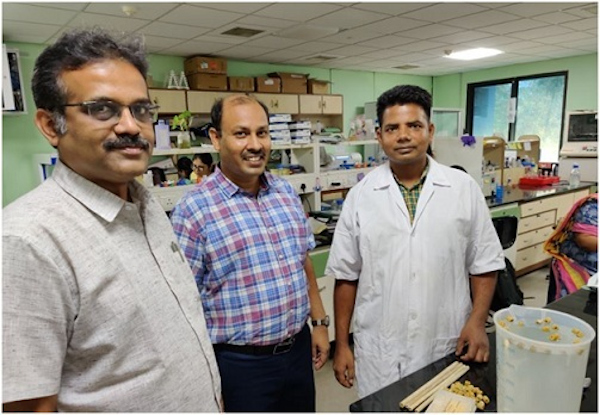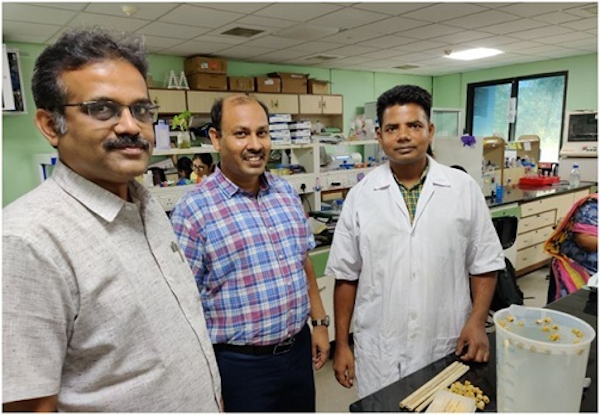Researchers at the Indian Institute of Technology (IIT) Madras have shown that simple copper-coated jute beads are highly effective in protecting water and preventing microbial contamination. These jute beads could be helpful in solving problem of water contamination and water-borne diseases in India, say researchers.

The researchers have developed easy methods to coat cuprous oxide or copper on little beads of jute that float on water. They chose jute because of two reasons – jute floats on water and jute sticks are an agricultural waste product that is affordable and available at low costs.
This research was led by Dr. Dillip Kumar Chand, Department of Chemistry, IIT Madras, and his research student Mr. Randhir Rai. The paper has been co-authored by Dr. Dillip Kumar Chand, Mr. Rai and Prof. Sathyanarayana N. Gummadi, Department of Biotechnology, IIT Madras.
“To prove the disinfectant properties of the copper-coated jute beads, we took four beakers of clean water, added uncoated jute beads to one, jute beads coated with copper to the second, jute beads coated with copper oxide to the third and left the fourth beaker as it was, and studied the microbial content in all the beakers periodically,” said Randhir Rai.
“The use of copper as a disinfecting material has been well known in India and people commonly store water in copper vessels for this purpose and there have been many studies worldwide that reported the disinfection properties of copper and its salts. ”
When the beakers were kept uncovered for 24 hours, the ones with copper and copper-oxide-coated beads did not have any microbial growth while the ones without the beads and with uncoated jute beads had significant microbial growth. After five days, the microbial contamination in the water with coated beads were far less than in the beaker without the coated beads. Prof. Gummadi helped the research team with microbial assays.
“The use of copper as a disinfecting material has been well known in India and people commonly store water in copper vessels for this purpose and there have been many studies worldwide that reported the disinfection properties of copper and its salts. However, beyond a certain limit, copper can be toxic, and so, it is important that too much copper does not leach into the water,” said Prof. Chand to India Science Wire.
The U.S. Environmental Protection Agency (EPA) recommends that the amount of copper in water be below 1.3 parts per million (ppm) for safety. The IIT Madras researchers showed that the copper that was coated on the jute beads did not leach to a large extent into the water, and even after five days, the amount of copper in the water was only around 0.8 ppm, far below the EPA mandate.
“Our study shows a simple and cost-effective way to keep water safe and empowers households and communities that lack potable water to protect themselves against a variety of waterborne pathogens,” added Mr. Randhir.
The team proposes to study the relationship between the properties of coated beads and ‘microbicidal’ efficacy in future. The results were published in the reputed peer-reviewed journal ACS Omega.
Source:Vigyanprasar
Image Courtesy: Vigyanprasar
You may also like
-
New Heat-Based Approach To Cancer Treatment Can Reduce Chemotherapy Doses
-
Scientists Take A Major Step Towards Unification Of Classical & Quantum Gravity
-
India Graphene Engineering and Innovation Centre (IGEIC) Under the Vision of Viksit Bharat@2047 Launched
-
New High-Performance Gas Sensor can Monitor Low Level Nitrogen Oxides Pollution
-
Antidepressant Drug can be Repurposed for Treating Breast Cancer
